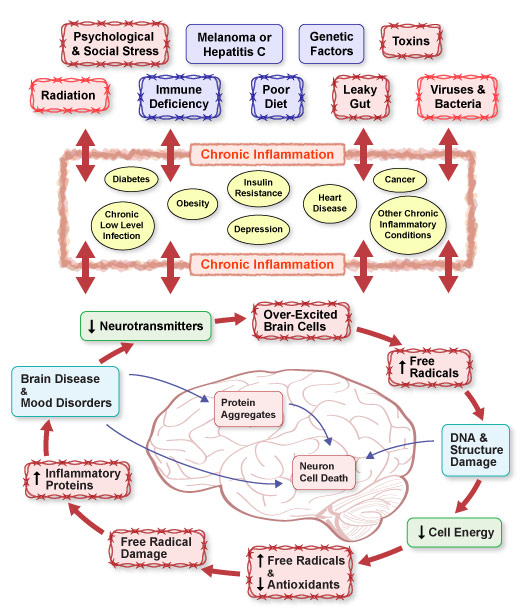Natural Herbal Help for Depression, Chronic Stress, and Mood or Psychological Disorders

Considered a severe neurological disorder, experts estimate that between 15-20% of people worldwide suffer from depression. Conventional antidepressant drugs are ineffective in up to 30% of patients. Could turmeric compounds help? Some research suggests that they can-especially curcumin. (iv.124)
Chronic stress—psychological, social, and physical—is now understood to play an important role in neurological damage. This can cause and exacerbates depression, anxiety, and other mood or psychological disorders. Because of this, many antidepressants also alleviate the effects of chronic stress. Some of these include memory loss and cognitive deficits. Unfortunately, some antidepressants also have adverse side effects. (iv.28, 124)
Turmeric compounds are also known to have anti-stress properties. Natural herbal remedies made with turmeric may provide safe and effective relief for some people diagnosed with stress and mood disorders, including depression. (iv.28, 124)
What are the Symptoms and Causes of Major Depression?
Some of the symptoms associated with major depressive disorder include: (iv.7, 124)
- Agitation
- Fatigue
- Feelings of despair and guilt
- Inability to concentrate
- Inability to learn
- Insomnia or excessive sleep
- Irritable mood
- Lack of interest in enjoyable activities
- Memory loss

Mood Disorders and Inflammation
What Does Inflammation Have to Do With Mood Disorders?
Medical research has determined that chronic inflammation is a primary contributing factor to the development and progression of psychiatric illness, including major depression. The latter was a somewhat confusing discovery since inflammation is typically associated with a heightened immune system response and higher levels of immune system cells. However, people with depression usually have lower levels of lymphocyte and natural killer immune system cells. (iv.28)
Despite the seemingly reduced immune system response, blood tests showed increased production of inflammatory cytokines in these patients. In fact, higher levels of cytokines are linked to more severe symptoms in depression. One explanation for the conflicting evidence could be that the immune system's T-cells are dysregulated and promote inflammatory cytokines. For example, this could occur when less T-reg cells that produce anti-inflammatory cytokines are produced and more T-eff cells that stimulate inflammatory IL-17 cytokines are secreted. (iv.28)
Research indicates that many physical health conditions, chronic stress, interferon-α (IFN-α) treatment for cancer or hepatitis C, and lifestyle factors (e.g., diet and social environment) cause inflammatory activity in the brain. All of these affect a number of areas that regulate mood. These stressors stimulate inflammatory proteins in the brain and activate microglia cells, which are the brain's version of immune system's macrophage cells: (iv.28, 30)
Once activated, a destructive, cascading cycle of inflammatory cytokine proteins and free radical damage to mitochondria in brain cells occurs. This cell damage translates into a number of different mood disorders: (iv.28, 30)
| MOOD DISORDER | INFLAMMATORY SYMPTOMS IN BRAIN |
|---|---|
|
Bipolar Behavior Depression Schizophrenia |
Excitotoxicity: The brains of suicide victims with depression, bipolar disorders, and schizophrenia show evidence of chronic inflammation. This includes over-excited brain cells and increased microglial density. |
Depression |
High levels of chronic inflammatory markers: Obesity and stress correspond to increased levels of pro-inflammatory cytokine proteins IL-6, hs-CRP, and IL-1ra as well as inflammatory COX enzymes. All correlate with increased occurrence of mood disorders such as depression. Reduced production of neurotransmitters related to mood: Increases in the cytokine protein IL-6 in cerebrospinal fluid appears to inhibit serotonin. This is an important neurotransmitter for regulating mood. Studies indicate inflammatory cytokine proteins, transcription factors, and kinase proteins stimulate an enzyme that breaks down the tryptophan precursor to serotonin. The metabolites from the breakdown of serotonin reduce levels of other important neurotransmitters that can affect mood. Specifically, these metabolites can inhibit production of glutamate and dopamine. This could explain why IFN-α treatment for hepatitis and melanoma are also associated with reduced dopamine levels. Since IFN-α stimulates cytokines such as IL-6, it could promote the enzyme that breaks down serotonin and block dopamine production. |
Depression Loneliness |
Increased cortisol and corticotrophin-releasing hormone concentrations: Higher levels of inflammatory transcription factor NF-κB activity and reduced glucocorticoid receptors can increase levels of cortisol and related hormones. In turn, this can also increase resistance to glucocorticoid anti-inflammatory treatments. |
|
Anxiety Depression Neurotic Behavior Obsessive-Compulsive Behavior |
Activated dACC region in brain cortex: Psychosocial stressors activate dACC and increase levels. The causes greater sensitivity to any other stimuli and contributes to anxiety. |
Depression |
Exposure to toxins that damage neurons: Animal studies show that toxins increase levels of the inflammatory protein TNF-α. The related free radical stress damages or destroys dopamine-producing neuron brain cells and reduces levels of the neurotransmitter dopamine (associated with depressive symptoms). |
How Can Turmeric Help?
Turmeric compounds have antioxidant and anti-inflammatory properties that could counteract or prevent some of the underlying chemical imbalances in mood disorders. Studies suggest that COX-2 inflammatory enzyme inhibitors such as curcumin could reduce symptoms and even bring about remission in some patients with depression. COX-2 inhibitors even appear to benefit those patients who are non-responsive to conventional antidepressant medication. (iv.28)
In other studies, substances that inhibit the inflammatory transcription factor and kinase proteins p38 and MAPK had antidepressant effects. Curcumin is known to inhibit these inflammatory proteins. Blocking them also helps prevent opioid tolerance. Researchers suggest that natural substances such as curcumin from turmeric that inhibit NF-κB and block excitotoxicity could also be beneficial in treating mood disorders. (iv.28)
Lab and animal experiments demonstrate that curcumin has these properties and others that could help prevent or relieve the symptoms of depression and other mood disorders:
| CONDITION | CURCUMIN EFFECTS |
|---|---|
|
|
|
Depression induced by chronic stress (iv.8) |
|
|
Depression (iv.3) |
|
|
Arsenic induced depression (iv.7) |
|
|
Stress-induced depression (iv.7) |
|
|
Stress-induced depression (iv.7) |
|
|
Chronic, unpredictable stress-induced abnormal behavior and depression (iv.7) |
|
|
Anxiety induced by stress (iv.17) |
|
|
Anxiety-like behavior induced by sleep deprivation (iv.18) |
|
Clinical Studies for Depression
Clinical evidence for turmeric compounds in treating depression is limited, but generally positive. In one study, adding curcumin to antidepressant treatment did not appear to improve their effectiveness. The 5 week study involved 40 patients. Twenty of the patients were treated with an antidepressant drug combined with 500 mg of curcumin a day, and 20 were given the antidepressant with a placebo. Symptoms improved in all patients after a week but there were no significant difference between the placebo and curcumin groups. The researchers did note that the curcumin group showed a positive trend toward more rapid relief of symptoms. (iv.175)
Results from two more recent randomized clinical trials showed positive evidence of the antidepressant effects of turmeric compounds:
In a 6 week blinded study, patients were given 1 of 3 different treatments: 1000 mg/day of curcumin/turmeric oil, 20 mg/day of fluoxetine, or a combination of the two (20 patients in each group). Curcumin was as effective as fluoxetine, using the Hamilton Depression Rating Scale. The combination treatment showed a slightly better response rate, but it was not statistically significant. (iv.176)
In an 8 week double-blinded, placebo controlled clinical trial, 56 patients were randomly assigned to take either 1000 mg/day of curcumin or a placebo (28 in each group). Almost all of the participants finished the study (25 in the curcumin group, and 27 in the placebo group). Baseline differences in depression scores were negligible between the two groups. In both groups, the test scores for both depression and anxiety improved for the first 4 weeks. However, after that improvements in both anxiety and depression symptoms continued only in the group taking curcumin. (iv.177)
These studies are promising, given the risk of negative side effects (such as increased suicidal thoughts or actions, insomnia, and anxiety) from pharmaceutical antidepressants. Turmeric compounds have none of these potential side effects. (iv.178-182)
Other Beneficial Turmeric Compounds to Boost Mood
Other turmeric compounds may also help prevent or relieve the symptoms of mood disorders. Studies show they are able cross the brain-blood barrier in order to benefit neuron brain cells. (iv.10, 34, 38-39, 125)
These include:
| TURMERIC COMPOUND | EFFECT |
|---|---|
|
|
|
|
|
|
|
|
|
|
Join the 1000s of People Who Are Discovering the Benefits of Turmeric.

Healthceuticals® Turmeric Curcumin Complex
100% Certified
Organic ingredients
- Organic Turmeric Extract - standardized to 95% curcuminoids.
- Organic Whole Turmeric - provides full spectrum antioxidant, anti-inflammatory turmeric benefits, including turmerones and numerous vitamins, minerals, and phytonutrients
- Organic Black Pepper Extract - standardized to 95% piperine; dramatically enhances bioavailablity.
- Organic Phospholipids - markedly improve absorption.
- Organic Ginger - works synergistically with turmeric to provide more powerful benefits.
- Absolutely FREE of potentially harmful additives and fillers such as magnesium stearate.



